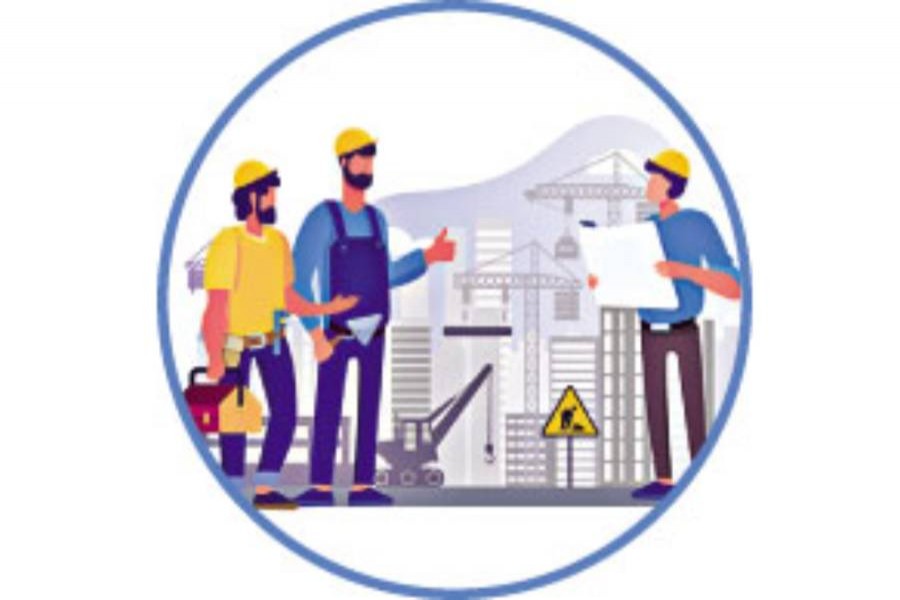
Published :
Updated :

The spiralling rise in cost of construction materials has put both real estate companies and construction enterprises in a fix. According to the Trading Corporation of Bangladesh (TCB) data, 60-grade mild steel is trading anywhere between Tk88,000 and Tk94,000 per tonne over the course of the year. Similarly, price of 40-grade steel is hovering around Tk83,000-Tk85,000 per tonne. If one looks at price of a truckload of bricks, prices have increased somewhat more substantially from a peak of Tk28,000 in 2021 to a peak of Tk42,000 in 2022.
Although traders state that the price increase of several construction materials has been due to increase in prices of imports, they also contend that the scarcity of the greenback and higher exchange rate between BDT and dollar are the main bottlenecks. Other issues that have fuelled the price of raw materials are the increased cost of transportation (due to a big hike in vehicle fuel recently) and of course higher primary energy price that have raised the manufacturing cost.
One of the primary building blocks of any construction remains the traditional brick. Brick kilns depend on coal to make bricks. According to some traders, the cost per tonne of coal has shot up significantly (from Tk22,000 to Tk31,000) over the course of a year - a stupendous hike of nearly 41 per cent! If that is true, this will have a major consequence on construction cost. Although experts contend that concrete blocks will be replacing the venerable brick over time, this is a long drawn process. Presently the bulk of public road construction and building projects are done using the traditional brick. Hence, there is no way round this problem in the present at least. When one looks at other materials like sand, which is used for concrete mixture, plaster sand and white sand - all of these have posted price rise per tonne anywhere from 15 to 20 per cent. This is not a new trend. Prices of most of these materials had also shot up further last year compared to the preceding year.
The most severely affected are house builders or real estate companies. It is very difficult to make an estimation of costs if there is such volatility in the market. While the largest of construction companies in the sector may have long-term contracts with producers / importers / traders of raw materials, or, some of these companies may have already made investments in backward linkage for materials needed, that is simply not the case for the majority of operators in the market. For most small-scale builders, the situation is not easy and any upset in prices results in halting of construction to revise prices or to simply delay start of construction.
If we look at the supply of steel in Bangladesh, the rerolling mills depend on imported scrap metals. Hence any devaluation in the local currency and foreign currencies will have direct impact on price of raw materials. Then of course there is price volatility in international markets for the said material. Back in 2021, scrap metal prices were hovering between US$275 and US$350 per tonne and retail prices from local mills depended on the brands selling steel.
What is apparent from the data over the course of a year is that prices are on the upswing on a year-to-year basis. One has to contend with the fact that the global economy had gone into mothballs during the 2-year Covid period. While the production lines have reopened, overall, international supply chains keep getting hammered from factors beyond their control - a massive increase in energy costs and this caused unheard-of rise in shipping costs, which is only now beginning to stabilise. Raw material import and its cost are dependent on numerable factors, but the outlook is not very rosy. One cannot discount the fact that China remains off limits in many ways due to its zero-Covid policy. We live in the age of globalisation where supply chains are intertwined and any disruption in the chain has far reaching consequences.
Bangladesh has been undergoing massive infrastructure development over the past decade. Numerous mega projects are underway presently. These cost escalations, whatever their circumstances, have been taking a toll. We have had numerous setbacks in terms of completion dates and every time, the project cost has gone up. Why can't we plan for long-term procurement of raw materials both with domestic and international suppliers? Fixed price contracts are nothing new and we have such contracts for liquefied natural gas (LNG) supply. Yes, some experts argue that we end up paying more if there is a price drop in the international market, but then it also saves us from price shocks when the price goes through the roof. So, why can't we have similar contracts for items like brick, concrete block, steel, sand, etc.? The answer lies elsewhere. Perhaps contractors want delays in construction so that price revisions can be made.
Most mega projects are financed by foreign loans that carry hefty interest rates and tight repayment schedule. Hence, if project timelines keep getting extended, there lies a possibility of projects ending at the time of the first repayment instalment on the loan taken is due. That creates a huge problem for the exchequer since the benefit that was to accrue from the project in the first place is wholly defeated. We need to rethink our priorities here. There is little room for unprofessionalism. Also profiteering at the cost of the economy needs to be tackled, if we want to reap the benefit of such public works.


 For all latest news, follow The Financial Express Google News channel.
For all latest news, follow The Financial Express Google News channel.